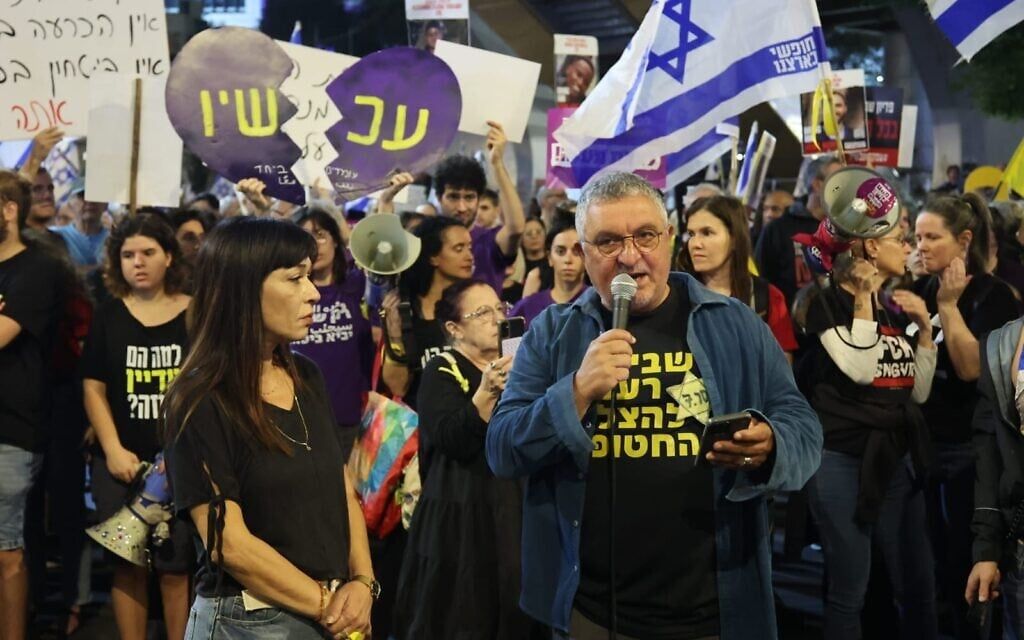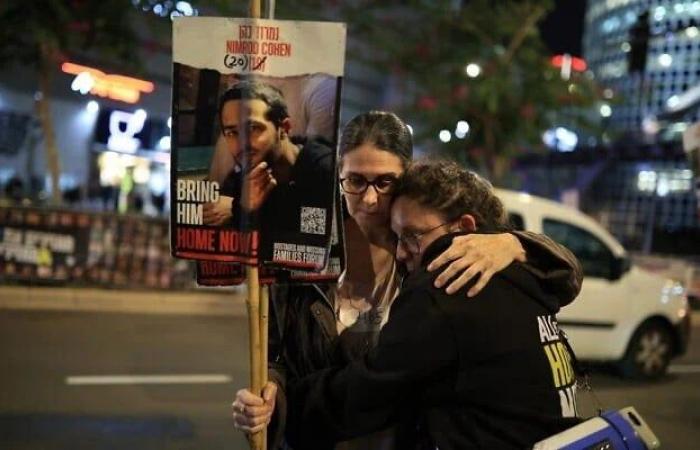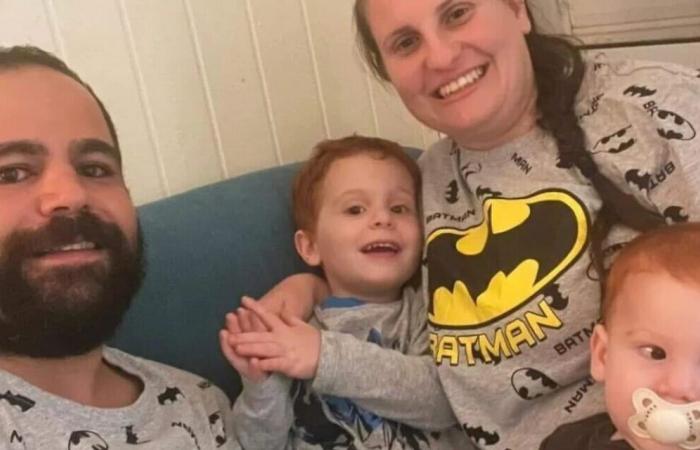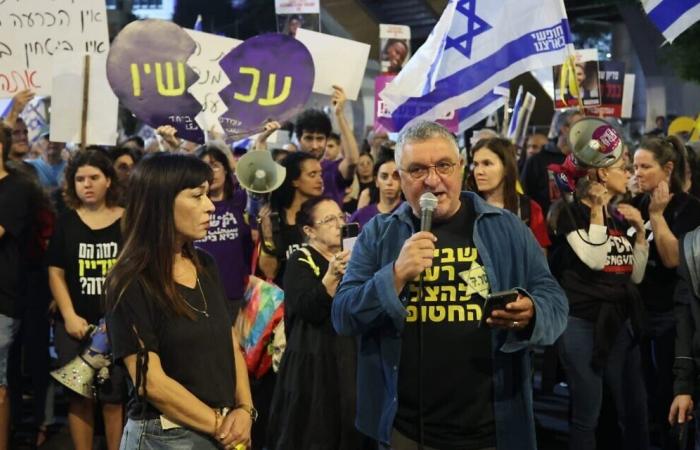Families of Israeli hostages held in the Gaza Strip gathered Wednesday at Hostage Square in Tel Aviv, where they have been holding rallies for more than a year, as news of the clauses of the agreement yet to be concluded with the Palestinian terrorist group Hamas to end the fighting in the Gaza Strip and return the hostages.
After more than fifteen months of captivity in Hamas jails, the first group of 33 hostages is expected to be returned to Israel starting Sunday, before negotiations on the release of the remaining 65 hostages begin about two weeks later.
The first group, made up of children, women, men over 50 as well as the injured and sick, will be gradually released over the next six weeks.
To not miss any of the news,
receive the Daily Headline on your email
By registering, you agree to the terms of use
Bring Them Home, a group representing hostage families, released a statement expressing “overwhelming joy and relief” at the deal, but for many the primary feeling was exhaustion and doubt, while they wait to know the fate of their loved ones.
“It’s a roller coaster,” said Yossi Shnaider, a cousin of Shiri Bibas who was kidnapped with her husband Yarden and her children Ariel and Kfir, aged 4 years and 10 months, during the Hamas pogrom on October 7, 2023 in southern Israel.
“We don’t know if they’re on the list, if they’re going to come back in the first phase, if they’re alive or not. In reality, we know nothing. It’s scary,” he said.
Protesters taking part in a rally calling for the release of Israelis held hostage in Gaza by Hamas, in Tel Aviv, January 15, 2025. (Jack Guez/AFP)
The fact that the hostages were sent back in small groups over several weeks, leaving families waiting, cast a shadow over the hope of seeing their loved ones released.
“The families can’t take it anymore,” he stressed.
“I have no words to describe how difficult it is. »
The Bibas family are among the most infamous hostages still held in Gaza. Ariel and Kfir are the only children left after a previous agreement reached in November 2023, which allowed the restitution of more than 100 of the 251 people captured during the assault by Hamas terrorists, during which more than 1,200 people, mostly civilians, were killed on the deadliest day in Israel’s history since the Holocaust.
The Bibas family – father Yarden, Ariel, mother Shiri and baby Kfir – were kidnapped by Hamas terrorists from Kibbutz Nir Oz on October 7, 2023. (Courtesy)
A video showing armed Hamas terrorists kidnapping Yarden Bibas on October 7 was released by Israeli media last year. The plight of this family caught the attention of Israelis as the war in Gaza raged.
“It’s hell”
-The terms of the deal that could end the war were agreed after months of talks and heavy pressure from the administrations of outgoing US President Joe Biden and President-elect Donald Trump, who promised “a TERRIBLE price to pay” if the hostages were not returned.
According to the Hamas Ministry of Health, more than 46,000 people have died in Gaza since the start of the conflict. The figures published by the terrorist group are unverifiable and do not distinguish between civilians and terrorists. The war has also devastated the enclave, creating a humanitarian crisis for more than two million people trapped under the rubble.
To date, 407 Israeli soldiers have been killed since the start of the Gaza ground incursion against Hamas and during operations along the Gaza border. That toll includes a police officer killed during a hostage rescue mission and a Defense Department civilian contractor.
Hamas agreed on Wednesday, and the Israeli cabinet is expected to back it on Thursday. Foreign Minister Gideon Saar cut short a visit to Europe to attend the security cabinet vote.
“It’s the right decision. This is an important decision,” President Isaac Herzog said in a statement. “There is no greater moral, human, Jewish or Israeli obligation than to bring our sons and daughters back to us. »

Demonstrators protesting against a possible hostage deal with Hamas, in Jerusalem, January 14, 2025. (Chaïm Goldberg/Flash90)
Polls show that most Israelis favor a deal to recover the 98 Israeli and foreign hostages still in Gaza and end a war that has increasingly isolated Israel internationally and makes the IDF pay an increasingly heavy price.
“I think it’s amazing, we’ve waited so long for our hostages to finally come home, praying, hoping, and now it’s finally happening. And we are so excited,” Ariella Cohen, 18, said from a Jerusalem cafe surrounded by friends.
But the deal also sparked strong opposition from hard-line nationalist members of Prime Minister Benjamin Netanyahu’s government, as well as some hostage families themselves.
Hardliners say the terms of the deal will harm Israel’s long-term security, while relatives of male hostages, including serving soldiers and military-age men , fear they will never be released, given the complications linked to negotiations with Hamas, which remains in Gaza despite losing thousands of terrorists and most of its top leaders.

Danny Elgarat, whose brother Itzik Elgarat is being held hostage by the Hamas terror group in Gaza, speaking to protesters calling for a deal to secure the release of Hamas hostages, on Begin Road, Tel Aviv, on July 26 October 2024. (Credit: Yoram Shpirer/Protest Movement for Democracy)
“It’s not a deal, it’s just hell,” said Daniel Algarat, whose brother Itzik Elgarat, 69, was kidnapped from Kibbutz Nir Oz on October 7, 2023.
“Trump promised us hell and we are in hell,” he said.
“The government does not have the mandate to bring back some of them, it must bring them all back. »
“My brother will arrive during the first phase, but we don’t know in what condition. We don’t know if he’s alive, we don’t know anything. »






